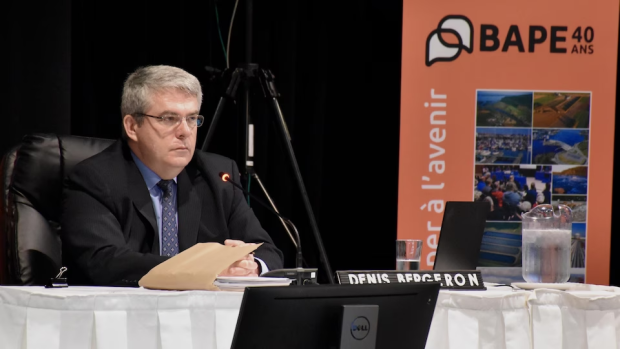GNL Québec project refusal was purely political decision: developers

Developer GNL Québec's request for arbitration to receive $20 billion US in compensation from the Canadian government was made public on Tuesday.
American company Ruby River Capital LLC says that Quebec and Ottawa rejecting its $14-billion development projects in Saguenay, Que., was a purely political decision.
For the first time, the company has confirmed that two projects, the natural gas liquefaction terminal that would have been built in Saguenay and the 780-kilometre gas pipeline, have been officially scrapped.
"Following the cancellation of the GNL Québec and Gazoduq projects, the applicant and Symbio tried to resolve the matter amicably through direct discussions with the Quebec and federal governments, but to no avail," a GNL Québec statement read. Symbio is the intermediary company between Ruby River Capital and the two projects.
The request for arbitration was filed on Feb. 17 at the International Centre for Settlement of Investment Disputes (ICSID), linked to the World Bank, Radio-Canada reported.
In the document, the company suggests the Quebec government changed the rules of the game along the way to make a purely political decision by refusing to approve the project.

"Ruby River's claim stems from the arbitrary, unfair and discriminatory treatment of Symbio by the government of Quebec and the government of Canada," a company spokesperson said in a written statement.
GNL Québec added that the Canadian government did not want to contradict Quebec's refusal. Ruby River Capital's request targets the Canadian government, which it also considers responsible, according to international laws, for the Quebec government's actions.
Anticipated profits losses
The $20 billion US claimed is equivalent to the loss of anticipated profits over 25 years. This would be a conservative estimate given the rise in energy costs, mainly due to the war in Ukraine.
GNL Québec says it spent $165 million Cdn from 2014 to 2021. The project had up to 55 employees, even going up to 100 taking into account the various consultants under contract.
Environmental process
In the Feb. 17 document, the company says it participated in good faith with the Quebec Environment Ministry throughout the environmental assessment process and says it responded to all requests.
GNL Québec also maintains that it had the support of politicians in Quebec. It cited a Radio-Canada article from January 2020 to show that Quebec Premier François Legault openly supported the project. After the meeting with one of the two developers, Jim Illich, the premier tweeted that the project would reduce greenhouse gas emissions by 28 million tonnes by replacing coal-fired power plants.
BAPE biases
Ruby River Capital argues that Quebec's environmental assessment agency, the Bureau d'audiences publiques sur l'environnement (BAPE), was biased in its hearings and final report. The BAPE found that the risks linked to the GNL Québec project outweighed the gains.
Above all, the company took issue with a statement by Environment Minister Benoit Charette on the day the report was tabled.
"We set three very clear conditions: find social acceptability, promote energy transition and reduce greenhouse gas emissions. The BAPE investigation failed to confirm that these three conditions were met. The ball is therefore in the developer's court," Charette said.
Ruby River Capital argues that these criteria were invented haphazardly, at the last minute, specifically to hinder the project's approval.

According to the company, the eventual refusal in July 2021 was not based on environmental elements but by the upcoming election. GNL Québec has always claimed that its project would reduce pollution globally.
It also denounces a policy prohibiting additional noise that would have been imposed on them to avoid harming the beluga population in the Saguenay.
The company says a $66-million announcement from Quebec and Ottawa shortly afterward, in August 2021, to allow a conveyor at the Saguenay Port shows that the conditions it had to meet were established to single out GNL Québec.
After being refused permission for the project, GNL Québec says it continued discussions with the province. The developers maintain that several high-ranking people in Quebec and Ottawa confirmed to them that the refusal had been political.
They even allege that Legault told a European head of state in August 2022 that he could authorize the project if Ottawa did the same but only after the October 2022 provincial election.


